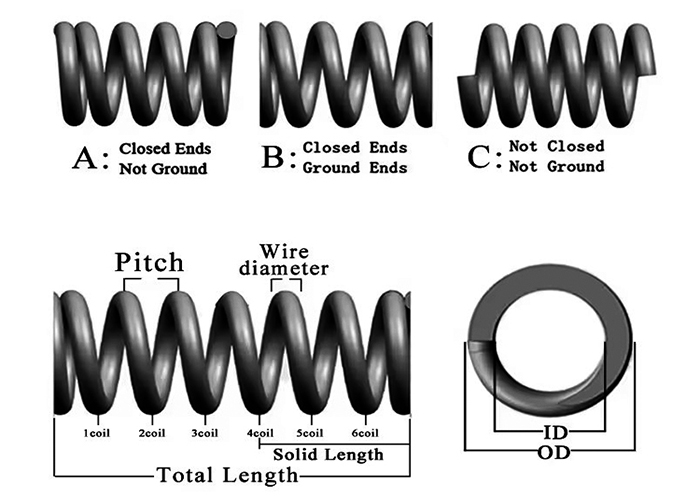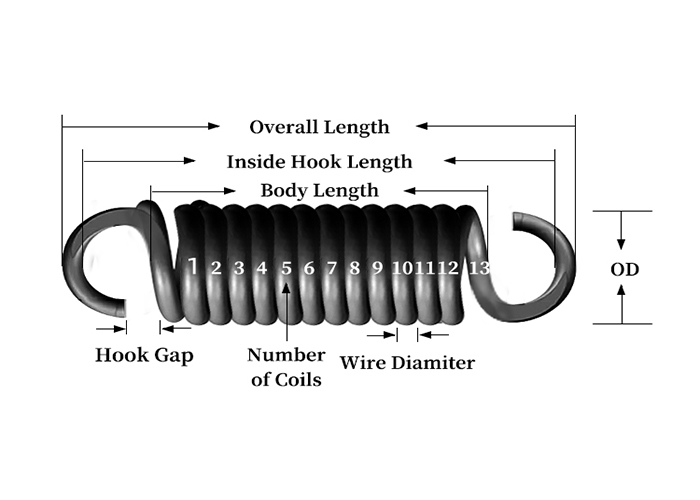At Makeway Spring,we manufacture custom headless extension springs,including small and conical types,for various industrial uses.We also offer a wide inventory.Contact us for more details.
Specifiche dell'acciaio inossidabile 304:MK-304SS-TSH01、MK-304SS-TSH02、MK-304SS-TSH03
Headless tension springs,with their precise tension, are commonly used in precision machinery or electronic instruments.
Headless tension springs provide critical tension or resetting functions,helping to maintain the positioning of components.
These springs, due to their compact design, can fit into limited internal spaces and return to their original position after being pressed.
Headless tension springs can provide sufficient return force,ensuring that equipment components reliably reset.
In automated production lines and industrial equipment, headless extension springs are commonly used to provide tension or resetting functions.



We have the capability to provide our customers with custom Tension springs to meet nearly any specification

Our high-performance coils are engineered to thrive in even the most challenging environments,providing superior performance when it matters most.We source only the finest materials,meticulously chosen for their purity,reliability,and biocompatibility.
At Makeway Spring ,we’re not just about springs;we’re all about quality.Our commitment to ensuring the highest standards for tension spring begins with comprehensive testing.From materials to dimensional accuracy and operational performance,we leave no stone unturned to guarantee your product’s excellence from the very start.
Test sui materiali:
Il tuo prodotto migliore merita i materiali più pregiati. Offriamo un'ampia gamma di materiali e li testiamo tutti, così puoi essere certo che il tuo prodotto sia al top dall'inizio alla fine.
Precisione dimensionale:
Misurare è più di quanto sembri. Utilizziamo strumenti di misura all'avanguardia per garantire una precisione micrometrica.
Test operativi:
Prima ancora di prendere in considerazione la spedizione delle molle, ciascuna di esse viene sottoposta a rigorosi test in ogni fase del processo produttivo, per garantire che ciascuna offrirà le massime prestazioni.
Dal tipo di materiale al diametro e al tipo di estremità, abbiamo tutto ciò che ti serve per creare le tue molle personalizzate e garantire prestazioni ottimali. Se non hai esattamente ciò di cui hai bisogno tra le molle in magazzino, scegli i nostri servizi di produzione personalizzati e ottieni la soluzione perfetta per la tua situazione specifica.
Our commitment to quality and customer satisfaction is unmatched,and we strive to provide exceptional service at every step of the way.Whether you need a single custom coil or a large order,we have the expertise and experience to deliver the results you need.Feel free to click below to request a quote or contact us for design assistance.

Le molle a compressione sono progettate per creare resistenza alla forza di compressione. Abbiamo aiutato le aziende a progettare, testare e produrre molle a compressione per un'ampia gamma di settori. Contatta oggi stesso uno dei nostri ingegneri e iniziamo il tuo progetto.
A headless tension spring is a type of tension spring without hooks or looped ends.Instead of having specific end fittings,it has open ends that can be directly attached to other components or structures.These springs are used for applications where a simpler connection is needed.
Headless tension springs are typically installed by attaching the open ends to the desired components or fixtures.The installation process may involve inserting the ends into designated slots or connecting them with other mechanical fasteners,depending on the application.
Dalla progettazione iniziale della molla alla produzione e alla consegna, le nostre best practice e il nostro controllo qualità garantiscono la consegna di componenti precisi e realizzati appositamente per il tuo progetto. Ogni soluzione è progettata per le tue esigenze.

Le molle a compressione sono un tipo comune di molla progettata per resistere alle forze di compressione. Queste molle sono tipicamente avvolte e sono ampiamente utilizzate in applicazioni come sospensioni automobilistiche, macchinari industriali e dispositivi elettronici.

Le molle per stampi sono progettate per applicazioni ad alto carico e sono comunemente utilizzate negli stampi per stampaggio e nei set di stampi. Queste molle sono solitamente realizzate in acciaio legato ad alta resistenza, che offre una maggiore resistenza alla compressione e una maggiore durata.

Le molle di trazione immagazzinano energia quando vengono allungate e tornano alla loro forma originale quando vengono rilasciate. Sono comunemente utilizzate in applicazioni come serrature, giocattoli e dispositivi meccanici. Le molle di trazione in genere presentano ganci su entrambe le estremità per il fissaggio.

Le molle di trazione senza testa sono simili alle molle di trazione tradizionali, ma sono prive di ganci o estremità tradizionali. Queste molle vengono utilizzate in applicazioni che richiedono metodi di fissaggio specifici per soddisfare i requisiti di progettazione.

Le molle degli orologi, note anche come molle principali, sono molle a spirale utilizzate per accumulare energia meccanica. Sono ampiamente utilizzate in orologi, giocattoli e altri dispositivi che richiedono un accumulo di energia. Queste molle possono essere caricate manualmente o meccanicamente e quindi rilasciare energia per alimentare dispositivi meccanici.

Le molle di torsione sono progettate per resistere alla coppia o alla forza rotazionale. Queste molle sono comunemente utilizzate in clip, interruttori, porte da garage e altri dispositivi in cui viene applicata una forza rotazionale, fornendo una forza di contrasto tramite torsione.

Le molle in ottone sono realizzate in ottone, materiale che offre un'eccellente resistenza alla corrosione e conduttività elettrica. Sono spesso utilizzate in applicazioni che richiedono resistenza alla corrosione o conduttività elettrica, come interruttori e terminali elettrici.

La formatura del filo comprende varie molle e parti realizzate piegando il filo metallico in forme specifiche. Sono progettate su misura per applicazioni specifiche e possono essere realizzate in forme complesse per adattarsi a dispositivi meccanici o elettronici specifici.
Ottieni preventivi e informazioni sui prodotti di prima mano: siamo disponibili 24 ore su 24, 7 giorni su 7 per rispondere a qualsiasi tua richiesta.
info@makeway-llc.com
+86 755 28459980
Stanza 1510, Edificio 13 Huanancheng, n. 1 Ping'an Avenue, distretto di Longgang, Shenzhen, Guangdong, Cina